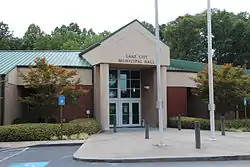Lake City, Georgia | |
|---|---|
 Lake City Municipal Hall | |
| Motto: The city of friendly people | |
 Location in Clayton County and the state of Georgia | |
| Coordinates: 33°36′29″N 84°20′26″W / 33.60806°N 84.34056°W | |
| Country | United States |
| State | Georgia |
| County | Clayton |
| Area | |
| • Total | 1.85 sq mi (4.78 km2) |
| • Land | 1.85 sq mi (4.78 km2) |
| • Water | 0.00 sq mi (0.00 km2) |
| Elevation | 968 ft (295 m) |
| Population (2020) | |
| • Total | 2,952 |
| • Density | 1,598.27/sq mi (616.99/km2) |
| Time zone | UTC-5 (Eastern (EST)) |
| • Summer (DST) | UTC-4 (EDT) |
| ZIP code | 30260 |
| Area code | 770 |
| FIPS code | 13-44508[2] |
| GNIS feature ID | 0332165[3] |
| Website | www |
Lake City is a city in Clayton County, Georgia, United States. The population was 2,612 at the 2010 census.[4]
History
The Georgia General Assembly incorporated Lake City in 1951.[5] The community was named for a lake which once was located at the town site, but since has been filled in.[6]
Geography
Lake City is located in northern Clayton County at 33°36′29″N 84°20′26″W / 33.60806°N 84.34056°W (33.608109, -84.340481).[7] It is bordered to the south by Morrow and to the west and north by Forest Park. Fort Gillem is directly to the north, within the Forest Park city limits. Downtown Atlanta is 11 miles (18 km) to the north.
According to the United States Census Bureau, Lake City has a total area of 1.9 square miles (4.8 km2), all land.[4]
Demographics
| Census | Pop. | Note | %± |
|---|---|---|---|
| 1960 | 1,042 | — | |
| 1970 | 2,306 | 121.3% | |
| 1980 | 2,963 | 28.5% | |
| 1990 | 2,733 | −7.8% | |
| 2000 | 2,886 | 5.6% | |
| 2010 | 2,612 | −9.5% | |
| 2020 | 2,952 | 13.0% | |
| U.S. Decennial Census[8] | |||
2020 census
| Race | Num. | Perc. |
|---|---|---|
| White (non-Hispanic) | 483 | 16.36% |
| Black or African American (non-Hispanic) | 1,169 | 39.6% |
| Native American | 11 | 0.37% |
| Asian | 522 | 17.68% |
| Pacific Islander | 1 | 0.03% |
| Other/Mixed | 89 | 3.01% |
| Hispanic or Latino | 677 | 22.93% |
As of the 2020 United States census, there were 2,952 people, 597 households, and 410 families residing in the city.
2000 census
As of the census[2] of 2000, there were 2,886 people, 950 households, and 690 families residing in the city. The population density was 1,594.5 inhabitants per square mile (615.6/km2). There were 1,022 housing units at an average density of 564.6 per square mile (218.0/km2). The racial makeup of the city was 51.91% White, 32.22% African American, 0.94% Native American, 9.67% Asian, 0.14% Pacific Islander, 3.19% from other races, and 1.94% from two or more races. Hispanic or Latino people of any race were 7.48% of the population.
There were 950 households, out of which 32.4% had children under the age of 18 living with them, 47.5% were married couples living together, 17.4% had a female householder with no husband present, and 27.3% were non-families. 21.2% of all households were made up of individuals, and 7.5% had someone living alone who was 65 years of age or older. The average household size was 2.78 and the average family size was 3.18.
In the city, the population was spread out, with 23.6% under the age of 18, 8.3% from 18 to 24, 28.8% from 25 to 44, 21.3% from 45 to 64, and 18.0% who were 65 years of age or older. The median age was 37 years. For every 100 females, there were 92.0 males. For every 100 females age 18 and over, there were 85.8 males.
The median income for a household in the city was $38,929, and the median income for a family was $42,600. Males had a median income of $26,875 versus $24,490 for females. The per capita income for the city was $15,877. About 8.5% of families and 8.7% of the population were below the poverty line, including 16.2% of those under age 18 and none of those age 65 or over.
Infrastructure
Transit systems
MARTA serves the city.
Education
Clayton County Public Schools operates public schools.
References
- ↑ "2020 U.S. Gazetteer Files". United States Census Bureau. Retrieved December 18, 2021.
- 1 2 "U.S. Census website". United States Census Bureau. Retrieved January 31, 2008.
- ↑ "US Board on Geographic Names". United States Geological Survey. October 25, 2007. Retrieved January 31, 2008.
- 1 2 "Geographic Identifiers: 2010 Demographic Profile Data (G001): Lake City city, Georgia". U.S. Census Bureau, American Factfinder. Archived from the original on February 12, 2020. Retrieved July 28, 2014.
- ↑ "City of Lake City". georgiainfo. Retrieved February 24, 2019.
- ↑ Krakow, Kenneth K. (1975). Georgia Place-Names: Their History and Origins (PDF). Macon, GA: Winship Press. p. 128. ISBN 0-915430-00-2.
- ↑ "US Gazetteer files: 2010, 2000, and 1990". United States Census Bureau. February 12, 2011. Retrieved April 23, 2011.
- ↑ "Census of Population and Housing". Census.gov. Retrieved June 4, 2015.
- ↑ "Explore Census Data". data.census.gov. Retrieved December 13, 2021.
